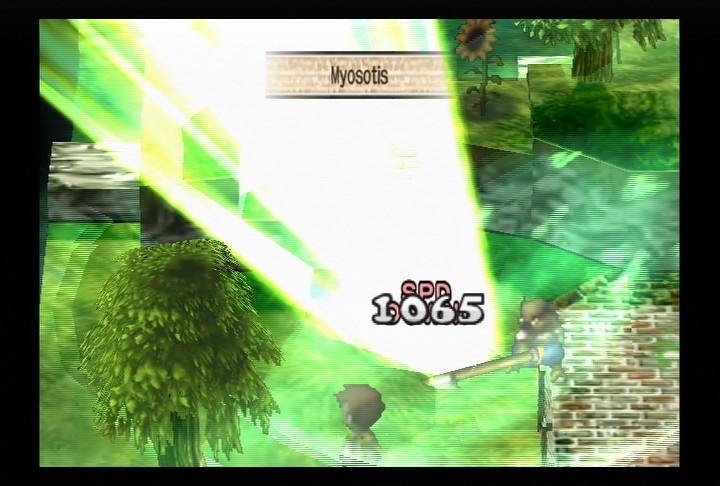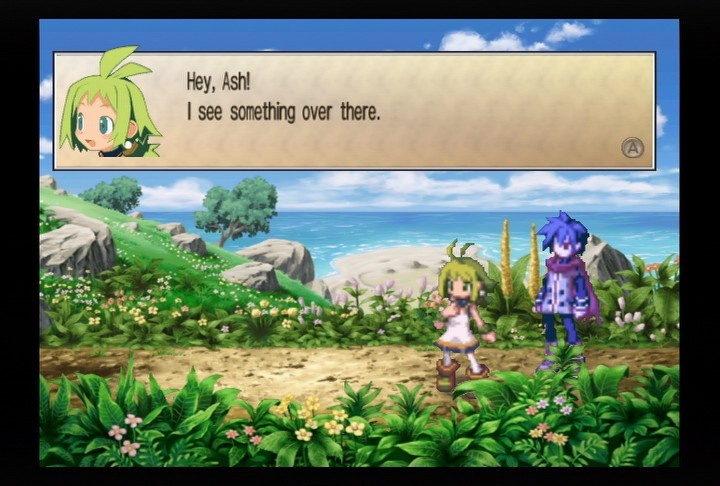Phantom Brave: We Meet Again is an updated version of one of Nippon Ichi's less appreciated strategy role-playing gems. Its gameplay is presented in a friendly pick-up-and-play style that never undermines the game's challenging aspects or tactical sophistication. A new scenario has been added to entice fans of the PlayStation 2 original back again, along with improved visuals and major menu tweaks. Though far from revolutionary, this new iteration still satisfies.
You control a fledgling mercenary named Marona, an orphaned girl with the uncanny ability to summon the dead. She's guided by Ash, a skilled warrior whose tragic death is mysteriously tied to an ancient evil, and together they slaughter monsters to protect the innocent. The plot's simplicity is hardly gripping, but it successfully produces a heartwarming adventure full of tender moments, soft humor, and the rare twist.
Traditional, turn-based combat occurs on a 3D board and features several intriguing elements, including grid-free, circular movement fields for natural maneuvering and fairly fast-paced battles. One of the key maneuvers in combat is Confining, a unique system that causes any phantoms you summon to fight alongside you to take on the properties of natural objects that you bind them to. For example, binding a phantom to a rock lowers its speed but boosts defense. Confining pressures you into making every tactical maneuver count, because matching classes with statistical effects can help or hinder you. Phantoms also abandon Marona after so many turns, which keeps the combat challenging. A unique protection system keeps you on your toes and enables powerful items, like sacred trees, to dramatically boost your enemies' stats. Using items that afford you protection is a vital tactic, but harnessing their power through confinement produces deadlier phantoms. You're also free to use any in-game item as a weapon, so you can run around whacking baddies with deadly watering cans for ruthless entertainment. Though the game implements streamlined menus and a convenient 3D reticle for easier targeting, the cursor has a hard time pinpointing destinations when the field is cluttered.
Phantom Brave's most impressive feature is its ability to remain easy to grasp while still challenging you strategically. The confinement system boils down to a matter of pacing, encouraging you to consider character class, confinement stat effects, and a slew of other factors before attacking. Choose wisely and your allies dominate the board, but act too hastily and you can be in trouble. Elemental weaknesses play a large role in decimating opponents, and you have a healthy selection of skill types and elemental attacks spanning all classes. Slippery ground types, like slimy swamps or icy cavern floors, challenge you to tactically position allies as they slide across the map. Crafty enemies work as a team to toss your characters off the board, use your own weapons against you, or even disarm Marona and wield her as a weapon--preventing you from summoning phantoms. Bosses put clever tricks in play to catch you off guard, such as powerful protection bonuses or warping abilities, and each requires a different strategy to defeat.

Plenty of easy-to-use customization options should please perfectionists eager to modify nearly every aspect of their team. A character creation system invests points into stats and elemental resistances, which is really useful when you're low on a certain class or resistance type. A blacksmith unlocks dormant skills in weaponry and levels your items, resulting in godlike gear that's a lot of fun to wield. A fusionist combines items to transfer skills, which can improve a weapon you're currently using or turn an under-leveled pointy stick into a spear of doom--saving you precious time that would have been spent unlocking those skills piecemeal. In an interesting twist, you can also add items to characters to impact base stats, or you can combine characters, which is a great way to craft your own elite squad that bends traditional class molds. For instance, you can blend a fighter with a mage to create a warrior with magical abilities.
The only real annoyances stem from repetitive gameplay that feels a little outdated. In typical Nippon Ichi fashion, you'll be repeating battles to level allies, weaponry, and skills. Battle scenarios are unfortunately repeated, pitting you against the same number, type, and layout of foes with minor, if any, adjustments. Alternatively, you can play through random dungeons with various restrictions and challenges, but the sheer lack of random enemies or enemy placement for regular stages shows the game's age. The blacksmith can lessen this frustration, however, by enabling you to forge pre-leveled hand-me-downs, which are great for your stragglers who need extra work. This method lets weaker characters quickly access powerful skills and cuts down on the time needed to level your support teams.
Highly detailed, prerendered backgrounds provide a colorful backdrop for cutscenes, and you can adjust the visuals to smooth out jagged sprites. The 3D battlefields are richly colored and dotted with molten lava lakes or pretty blue streams with the occasional fish. Spell effects are impressive, and skills are creatively displayed. Minor clipping occurs when your allies stand atop certain objects, and you'll occasionally notice weird panel clipping when you zoom the camera out, but both are rare complaints. The soundtrack has been remixed slightly but contains the same hauntingly beautiful violin segments, jazzy jungle beats, and soft ocean tunes from the original, and the boss music is catchy. The English voice work can get annoying, but you always have the option to switch it off or revert to Japanese, which is a nice touch.

You can spend hours leveling teams and weapons as well as mastering random dungeons to acquire special items, and this is aside from the time spent in the main game's 20 episodes. The all-new new scenario boasting a darker story, new skills and characters, and popular guest surprises is also a highly challenging treat. Adding to the replay value is a "new game plus" mode that lets you restart the adventure while retaining your level and any skills that you've acquired. Phantom Brave: We Meet Again is a charming adventure with fresh content and a relaxed play style that rarely limits the game's complexity.



